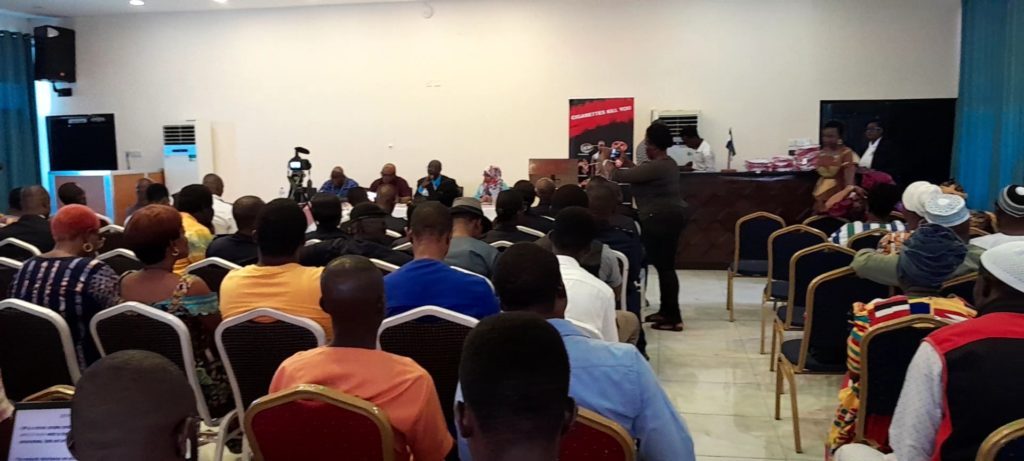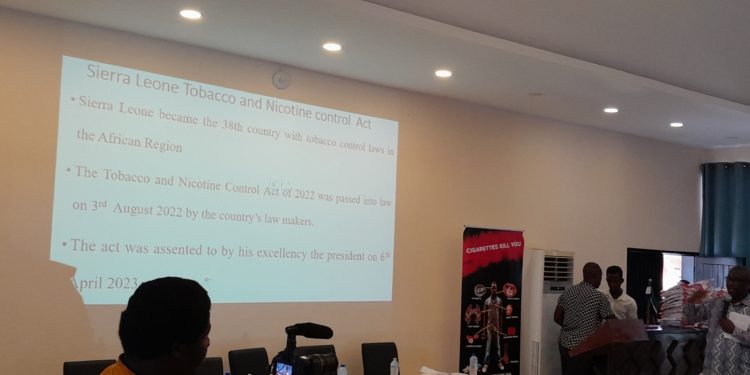Work on the draft of regulations required to operationalize Sierra Leone’s anti-tobacco law is in progress and nearing completion, a senior official involved with the process has said.
The Tobacco and Nicotine Control Act was passed by the country’s parliament on August 3, 2022 and it received Presidential assent on April 6th, 2023. But for it to be enforced, there is a need for a document detailing its implementation strategies and guidelines on how to deal with potential violators, among others.
This document will also incorporate issues left out in the Act, says Dr Santigie Sesay, Director of Non-Communicable Diseases and Mental Health in the Ministry of Health and Sanitation (MoHS).
He said that all that remains is for the document to be finalized and presented to legal authorities for validation, a process that is expected to conclude immediately after elections scheduled for later this month.
Sierra Leoneans will vote on June 24th for a new president, parliament and local council officials.
“Everything is in place and luckily we have resources to do that as well,” Dr Sesay told ManoReporters on the sidelines of a symposium commemorating World No Tobacco Day on Wednesday, May 31st.
World No Tobacco Day provides a platform to raise awareness about the dangers of tobacco and to renew global efforts to counter the industry’s influence, in the spirit of the World Health Organization (WHO)’s Framework Convention on Tobacco Control (FCTC).
Designed to control and regulate the production, manufacturing, importation and packaging of tobacco and other nicotine products, campaigners say the piece of legislation will protect the public from the health, social and economic burdens associated with tobacco use and exposure to its products. It specifically requires manufacturers to clearly label packages with warning signs of the health hazards of smoking and bans advertising, promotion and sponsorship of tobacco and all nicotine products.
The law takes cognizance of all forms of tobacco and nicotine products including the emerging forms of tobacco such as e-cigarettes. One particular form of this is Shisha, which campaigners say has become worryingly fashionable especially among young girls.
The MoHS is also expected to determine a grace period for tobacco and tobacco product importers to sell all current stock before the law comes into force. This will also allow time for much needed public education for increased awareness to ensure maximum compliance.
At last week’s event, several speakers raised concerns about the potential for the Act to end up being shelved due to lack of necessary support from relevant authorities.
Even within the Ministry of health itself, this concern appears prevalent, as expressed by Permanent Secretary Prince Cole, who chaired the occasion.
“We have good laws but they are not implemented,” he said, adding: “to ensure that [this] Act is implemented is not only with the government officials, but all of us; as good citizens of Sierra Leone, we need to make sure that the Act does not gather dust.”
The symposium was jointly convened by the Health Ministry and the WHO Country office and it brought together senior government officials and members of a civil society coalition which helped push for the enactment of the law and which will be instrumental in subsequent public sensitization ahead of its enforcement.

According to WHO, Tobacco is the leading cause of premature deaths and preventable disease burden in the world, killing half of all long-term smokers from many different nontransmissible or noncommunicable diseases including cancer, diabetes, lung and heart diseases.
Globally, about 8 million people are dying from tobacco use annually, according to figures from the UN health agency, which note that about one million of those are due to secondhand smoking.
Most of the deaths from smoking are recorded in low- and middle-income countries, where over 80% of the world’s 1.3 billion tobacco users live, according to the WHO data.
In Sierra Leone, the tobacco epidemic is said to be on the increase, fueled by increase in production by manufacturers who target poor nations as well as aggressive marketing strategy that targets particularly the young.
According to the latest Sierra Leone Demographic Health Survey (DHS2019), an estimated 18% of men and 3% of women between 15 and 49 years in the country are tobacco users.
Sierra Leone became the 38th country in the WHO African region to enact a bill into law domesticating the WHO FCTC, which was adopted at the 56th World Health Assembly on 21 May 2003. The country ratified the treaty in 2009.
Despite the protracted process, Sierra Leone’s journey to enacting its law is commendable considering the long time it took other countries to attain this milestone, said Dr Selassi D’Almeida, Health Systems Specialist at the WHO Country Office.
WHO worked with the Sierra Leone government, alongside civil society, to develop the law with technical support. Sierra Leone, for example, was among 15 low and middle-income countries that benefitted from the WHO FCTC 2030 Project in March 2017 designed to develop and implement effective, evidence-based tobacco control measures.
That project also facilitated an investment case study which, among other things, showed that tobacco use killed an estimated 3,300 people in the country that year. Sierra Leone was also found to be losing over 400 billion Old Leones from tobacco use, 73% of which were from economic productivity loss.
Catastrophic out-of-pocket healthcare expenditures were also associated with tobacco-related disease burden in the country contributing to increased poverty among families and communities, hence undermining efforts towards universal health coverage, as well as in reaching the country’s Sustainable Development Goals targets.






















